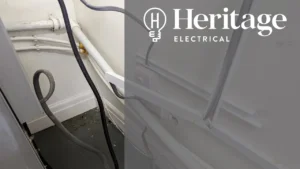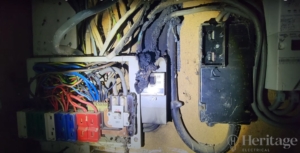Overview
We wanted to share an interesting experience we had while upgrading a consumer unit. During the process of replacing the old board with a modern RCBO board, we encountered an unexpected challenge. There appeared to be a fault in the upstairs socket ring final circuit. In this blog post, we’ll walk you through our journey of diagnosing and resolving the issue. We also uncover some very serious problems that can arise when installing new sockets yourself and highlight the importance of proper electrical work.
Read on or watch our video for more details.
Understanding the Ring Final Circuit
Before diving into our troubleshooting adventure, let’s briefly explain what a ring final circuit is. In the UK, many electrical socket circuits are wired as ring final circuits. This means that power travels from the consumer unit to a series of outlets and returns to the unit via another set of cables, forming a continuous loop. It’s a cost-effective and efficient way to distribute power to multiple sockets. If there is a fault on the ring circuit you can experience one of several potential problems.
Problems caused by a Fault on ring final circuit:
- Tripping of circuit protection: Power supply constantly being cut off
- Loss of Power: Complete loss of power to all sockets and devices connected on the circuit
- Risk of overheating: This could potentially lead to electrical fire
- Electrical Hazards: Lice conductors or electrical arcing
- Damage to devices: Sensitive devices can become damaged to voltage fluctuations
To resolve the issue, an electrician will need to identify the specific location and cause of the fault within the circuit. This may involve testing individual components, wiring, and outlets to isolate and repair the problem.
If you suspect a fault on a ring circuit then please get in touch with us for assistance.
Discovering a Fault on the Circuit
After upgrading the consumer unit with new RCBO protection, we ran a series of tests on the circuits. That’s when we discovered a dead short between the neutral and earth in the upstairs socket circuit. A dead short is a complete, low-resistance connection between two conductors, and in this case, it was between two conductors that should never be connected.
Ring Final Circuit Testing
Our first step in resolving the issue was to separate the ring final circuit into two legs. By doing this, we could isolate the problematic section. We made an educated guess about the halfway point and physically separated the circuit. Testing both halves separately revealed that one was functioning correctly, while the other still had the fault.
Inspecting the Sockets
Now came the task of narrowing down the faulty section of the circuit. With approximately 20 sockets on this circuit, we needed to inspect them carefully. As we removed some socket fronts, we noticed that a few of them were heavily loaded with wires, including a socket with three cables: ring in, ring out, and a spur for underfloor heating.
Ideally, when new circuits are added, they should be separate rather than relying on spurs from an existing circuit. This would have prevented the issue we encountered. Additionally, some of the sockets had metal fronts, which can pose a higher risk of shock if not installed correctly, especially when combined with loose screw terminals.
Finding the Culprit
Eventually, we pinpointed the problem to a single socket where the neutral conductor’s black insulation had been scraped off. This happened because the cable was tightly packed into a small back box and made contact with the box itself. When the socket plate was screwed back on, it created a connection to earth through the metal back box, resulting in the short circuit.
The Importance of Proper Electrical Work
This situation highlights the importance of hiring a qualified electrician for any electrical work, even seemingly simple tasks like changing sockets. Our customer had replaced PVC socket fronts with metal ones, but without the proper expertise, this led to a potentially hazardous situation.
Qualified electricians not only ensure your electrical work is safe but also provide the necessary paperwork, including minor work certificates and Part P certificates, which are essential for maintaining compliance and safety standards.
In conclusion, our experience with ring final circuit testing taught us valuable lessons about the complexities of electrical systems and the significance of hiring professionals for electrical work. It’s always better to be safe and secure when it comes to the electrical integrity of your home. If you’re ever in doubt about electrical work, don’t hesitate to reach out to a qualified emergency electrician to ensure the job is done right and safely. Your peace of mind is worth it.




